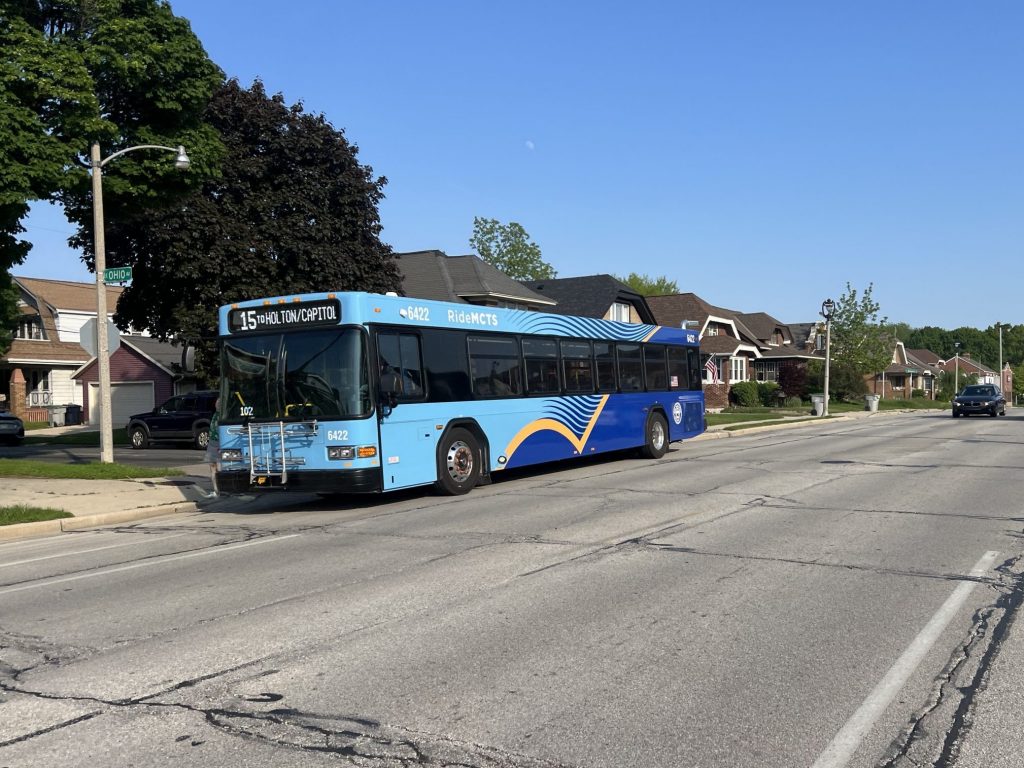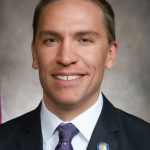Board Backs Plan to Target Bus Riders Who Don’t Pay
MCTS asked to develop policies to reduce fare evasion without causing conflicts.

MCTS Bus. Photo by Jeramey Jannene.
The Milwaukee County Board of Supervisors have formally asked for a plan to address fare evasion in the Milwaukee County Transit System (MCTS).
In June, MCTS announced a $10.9 million operating budget deficit for 2025 and 20,000 hours of service reductions slated for the fall. It came as a shock to policymakers who learned of the deficit, and the cuts after MCTS announced them in the press.
In the weeks that followed, as supervisors sought more information, MCTS revealed that it estimates one in four bus passengers does not pay a fare when they board the bus, costing the system $4 million annually. Upon learning this, Sup. Shawn Rolland drafted a resolution asking MCTS to develop a plan for addressing this. The board unanimously passed the resolution Thursday.
After Mass Transit funding from the State of Wisconsin, passenger revenue is the largest source of funding for the transit system. In 2023, MCTS collected just over $22 million in passenger revenue, often referred to by transit professionals as farebox revenue.
“The idea here is that we get a plan back from MCTS to mitigate the amount of fare evasion that we are seeing on the bus,” Rolland told his colleagues Thursday. “That’s all we’re asking for, it doesn’t ask for anything specific other than a plan that we can review and debate and consider before we go into the budget, where there might be budget ramifications.”
The resolution also recommends MCTS eliminate the pre-board fare payment system at Connect 1 stops. The Connect 1 bus platforms, built out as part of the system’s first, and so far only, bus rapid transit system include a kiosk that allow passengers to validate fares before their bus arrives. The validators also do not work well in the rain.
Rolland’s resolution adds that any solution should not “create a safety issue for operators or other passengers.” Fare disputes are the most common cause of conflict between bus operators and passengers in Milwaukee and across the county, according to local and national data. For that reason, current MCTS policy tells operators not to enforce fare collection.
Rolland told the county board’s Committee on Transportation and Transit that he has heard from the public that they don’t want a fare evasion policy to be “punitive to people who just don’t have the means.”
“There are unhoused neighbors who just they don’t have the funding to make this work,” Rolland said, adding that MCTS could potentially work with the county’s Department of Health and Human Services on the plan.
The system did create a new county-employed security force in 2024. The new security came after years of advocacy by the Amalgamated Transit Union Local 998 (ATU). The union has pushed for security, and for MCTS to address fare evasion. Union officials have said a lax fare policy costs the system money and contributes to a culture of disrespect for bus operators.
“Operators are sick of it,” ATU 998 Vice President Michael Brown previously told Urban Milwaukee. “Now they’re talking about deficit, well, collect some fares. You got new security, right?”
The union has always been skeptical of how MCTS monitors fare evasion. The button operators are supposed to push to record a free rider is located out of reach in many of the buses. Others don’t push the button because they feel MCTS won’t address the issue.
“It got to be such a joke I didn’t even push the button anymore,” said Tom Stawicki, a recently retired bus operator and legislative director for ATU 998.
Rolland wants MCTS to come up with a plan to address this “culture of fare evasion,” he said during the transit committee meeting. Some routes are worse than others, he said, adding that his own experience supports this conclusion. On the Connect 1, where riders can pay before they get on, Rolland said he sees many riders not paying fares.
“And I think if we do a little work and have a little bit of investment to correct this, we can realize a lot of revenue as a result,” Rolland said.
If you think stories like this are important, become a member of Urban Milwaukee and help support real, independent journalism. Plus you get some cool added benefits.
More about the 2025 MCTS Financial Issues
- FTA Tells Milwaukee to Crack Down on Fare Evasion — Even Where Fares Don’t Exist - Graham Kilmer - Dec 12th, 2025
- Transportation: County Names New Director of Transportation - Graham Kilmer - Dec 5th, 2025
- Transportation: MCTS Budget Picture Keeps Getting Worse - Graham Kilmer - Dec 4th, 2025
- Transportation: MCTS Avoids Full Route Cuts Under New Plan - Graham Kilmer - Nov 27th, 2025
- Transportation: Supervisor Pushes Fare Evasion Plan, Tangles With Sheriff - Graham Kilmer - Oct 23rd, 2025
- Transportation: Bus Cuts Leave Some Riders Stranded - Graham Kilmer - Oct 21st, 2025
- Transportation: Emails Reveal MCTS Officials Concealed Budget Deficit From Comptroller, County Board - Graham Kilmer - Oct 10th, 2025
- Transportation: 6 Bus Routes That Could Disappear in 2026 - Graham Kilmer - Sep 30th, 2025
- Transportation: MCTS Reaches New Labor Agreement With Union - Graham Kilmer - Sep 27th, 2025
- Transportation: Rep. Steil Calls For Greater Federal Oversight of MCTS - Graham Kilmer - Sep 17th, 2025
Read more about 2025 MCTS Financial Issues here
Transportation
-
Congestion Pricing Cuts Air Pollution in New York City
 Dec 14th, 2025 by Jeff Wood
Dec 14th, 2025 by Jeff Wood
-
FTA Tells Milwaukee to Crack Down on Fare Evasion — Even Where Fares Don’t Exist
 Dec 12th, 2025 by Graham Kilmer
Dec 12th, 2025 by Graham Kilmer
-
Will GOGO’s Bus Service Ever Get Going?
 Dec 9th, 2025 by Jeramey Jannene
Dec 9th, 2025 by Jeramey Jannene






















Typical knee jerk reaction, there are problems with the fare kiosk, get rid of them. Doing so will slow down Connect 1, which is one of its main benefit. Here is an idea, what are other cities (like Minneapolis and St. Paul) doing about fare evaders on their RBT routes.
This county needs leaders who understand that the future of transportation is public transportation systems like light rail and rapid bus transit. As long as supervisors work from a mindset that public transportation is only for the poor, this county will continue lag behind other urban counties. Public transportation is an amenity business look for when choosing to relocate. Of course, it doesn’t help that RRR (radical reactionary republicans) legislators in Madison don’t understand that cars and highways are unsustainable.
Word would soon get around that riders who don’t pay will be thrown off the bus. But in the long run, hiring a security guard to make sure all riders pay will cost more than the amount of revenue that could be gained. I’m left wondering just what sort of “plan” they can come up with.
Don’t expect much to come out of the county. The county is reactionary and only responds after the poor outcome. No one from transit would have been fired if they did not screw up the budget. All David Crawley cares about is not making him look bad politically. He was never on top of transit outcomes prior to the big budget screwup.
Dealing with fare evaders can be a difficult and sometimes risky thing for bus drivers. I don’t know what the answer is except to somehow keep them at arms-length from the process. I understand there is a button they are supposed to use to alert supervisors to evaders, but given the frequency of its use (and the apparent fact that they have to remove their seat belts and stand up from their seats to use it) it just doesn’t sound effective. On the El trains down here in Chicago, if someone is misbehaving on board, conductors have been known to stop the train, open the doors, announce that security has been called, and ask the perp to disembark. While that wouldn’t keep a bus driver at arms-length (train conductors are in their separate pods at the front of the train) I wonder if there might be some way for a recording to play. There does seem to be a lot of pressure put on the perp to leave because everyone is waiting and the train will not move until they leave.
I say, safety first. For drivers and passengers.
Some transit systems (perhaps those with greater ridership or more easily monitored trains) employ security who are there to check the riders fare cards (or apps, or transfers) to make sure the fares have been paid. It seems to work more easily on trains where they can readily walk up and down aisles and then simply go to the next car in a multi-car train. Probably not as easy to do on a bus.
I may be wrong because I haven’t lived in MKE for decades, but the city doesn’t appear to have as strong a “bus culture” as other towns, where it is viewed as a desirable option by many and not as an “only option.” This is true in many cities, where taking the bus is an indicator of class. Connect 1 is a great step in the right direction but new things like this require a concerted effort in educating riders and would be riders on how to pay first and then board. I saw a great video recently about how cities underestimate the education needed for new systems like this to facilitate adoption and appropriate use. Yes, it would be a shame to get rid of the kiosks for BRT. The Connect 1 busses already do not dedicated lanes or right of way. Getting rid of kiosks would basically ensure the line is not BRT. And, I’m all for free rides on the Hop, but wonder if some might be confused about when and how to pay.
Seems to me a good start would be to identify the 2-3 key fare evader “avatars” and then determine how to address each.